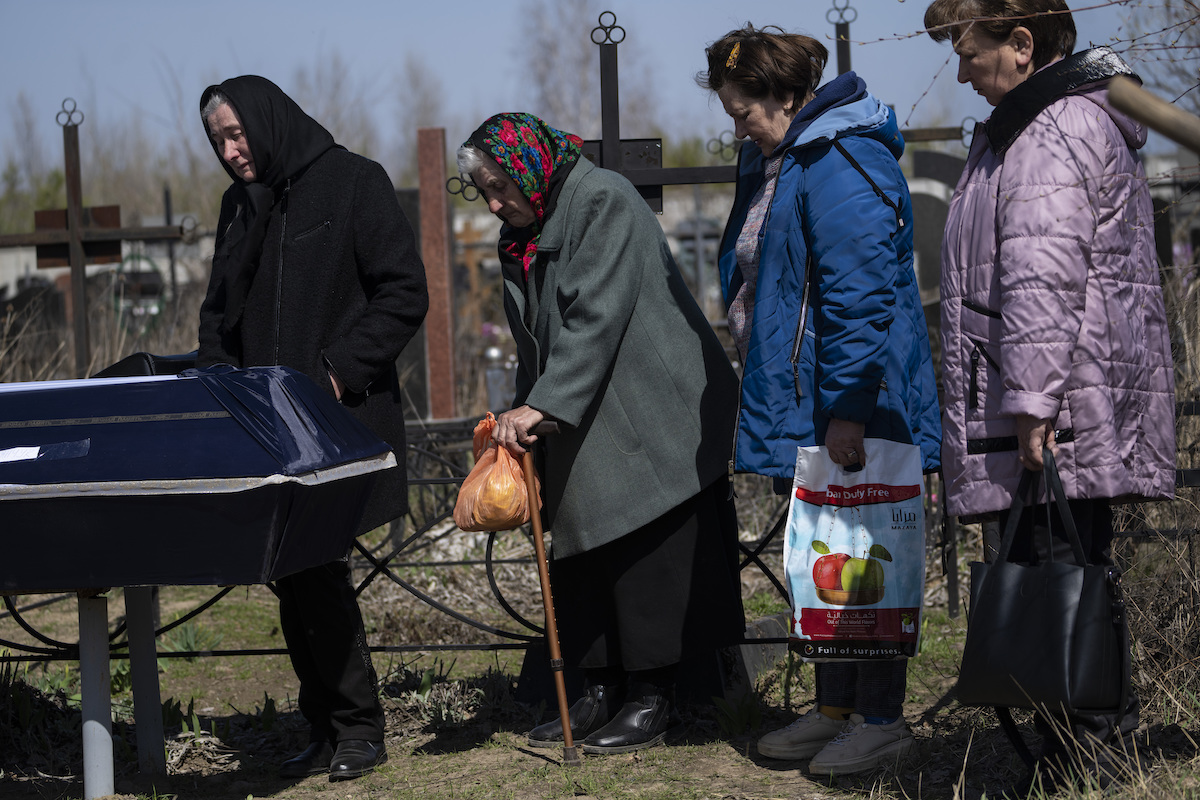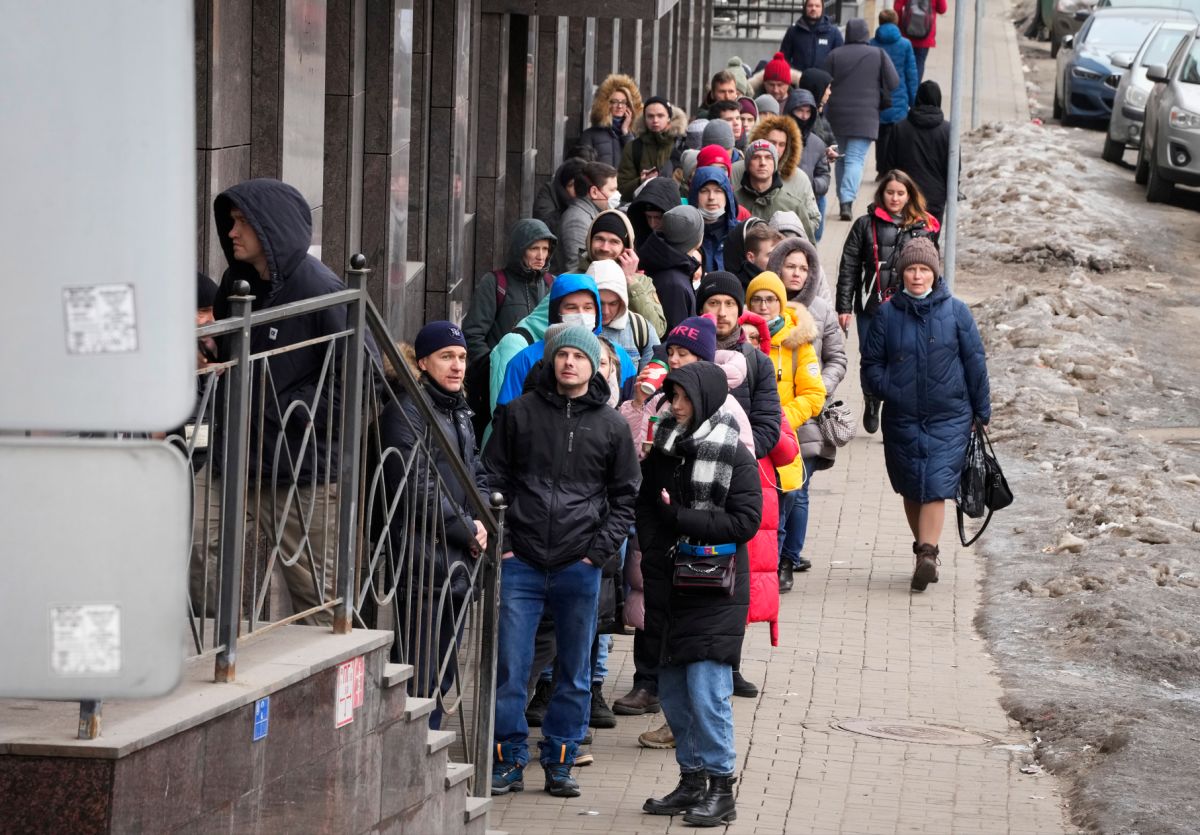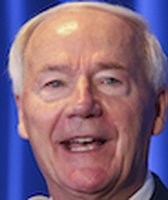Stand up for the facts!
Our only agenda is to publish the truth so you can be an informed participant in democracy.
We need your help.
I would like to contribute
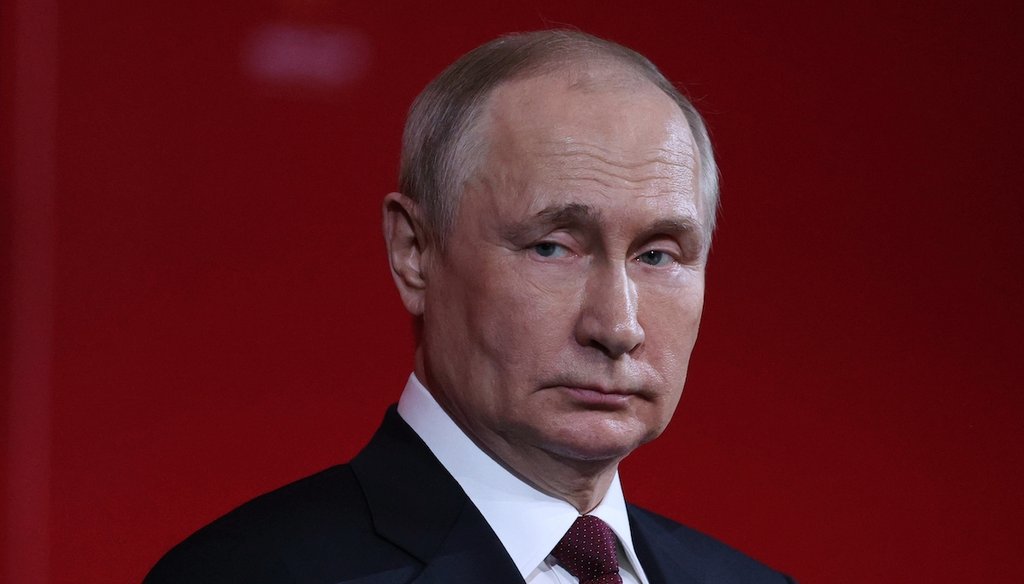
Russian President Vladimir Putin delivers a speech at a ceremony marking the 75th anniversary of Russian Federal Medical-Biological Agency in Moscow on Nov. 9, 2022. (Kremlin Pool Photo via AP)
It was 6 a.m. Moscow time on Feb. 24 when Russian President Vladimir Putin announced his "special military operation" in Ukraine.
"The purpose of this operation is to protect people who, for eight years now, have been facing humiliation and genocide perpetrated by the Kiev regime," Putin said in a televised address, employing the Russian spelling of Ukraine’s capital city. "To this end, we will seek to demilitarize and denazify Ukraine, as well as bring to trial those who perpetrated numerous bloody crimes against civilians, including against citizens of the Russian Federation."
About 500 miles and a time zone away, residents of Kyiv awoke to the sounds of explosions. In the small eastern city of Sloviansk in Ukraine’s Donetsk region, loud booms drove people from their beds in panic. Families packed belongings, swarmed ATMs and gas stations, and tried to flee the Russian invasion in cars, trains, planes and on foot.
One hundred Ukrainian soldiers and civilians would be dead by day’s end.
Hundreds of thousands more would be injured or killed by year’s end.
Sign up for PolitiFact texts
***
The war that Putin launched that day was built on a foundation of lies.
Government lies have abetted the invasion every day since.
Putin joined history’s most brutal authoritarians, deploying a well-worn and highly sophisticated propaganda machine to wage an unprovoked war. More than political rhetoric, spin or occasional lying, this playbook uses coordinated networks — hundreds of websites, state-run media, social media channels, fake fact-checking and oppressive censorship laws — to disseminate ruthless falsehoods. The aim is to justify brutality, blindfold its citizens and persuade potential allies.
Ukraine wasn’t being led by neo-Nazis and it wasn’t committing genocide. Putin employed those lies to co-opt Russian citizens whose family members would be sent to fight a war, kill others and possibly die themselves.
The lies have permeated the assault. When hundreds of bodies were discovered lying in the streets and homes of Bucha after weeks of Russian occupation, horrifying the world and generating global outrage, Putin’s regime claimed Ukrainians had staged the scenes. That was a lie.
To orchestrate his power and land grab, Putin long denied Ukraine was even a country — falsely characterizing its history and culture, suggesting the Ukrainians were simply Russians who needed to be brought back into the fold.
Although there’s little revelatory about Putin lying — the former KGB leader is widely understood to be the sponsor of worldwide disinformation efforts and cybermeddling (including in U.S. elections) — the human toll of the invasion of Ukraine is inescapable and horrific. By U.S. estimates, each side has seen 100,000 troops killed or injured. More than 40,000 Ukrainian civilians are dead. Fifteen million people have been driven from their homes.
The consequential nature of Putin’s disinformation made our choice clear: Putin’s lies about Ukraine are the 2022 Lie of the Year.
‘A monstrous forgery’: Russia’s lies about occupation and civilian casualties
Five days after Russian tanks crossed Ukraine’s border, the Russian embassy in Canada tweeted a lengthy — and to anyone watching from outside Russia, ridiculous — statement.
"The Russian army does not occupy Ukrainian territory and takes all measures to preserve the lives and safety of civilians," said the March 1 tweet, parroting Putin’s earlier statements that his effort would not involve an occupation. But even Russia’s own state-sponsored media had reported otherwise.
As journalists chronicled the violence and scenes of possible war crimes emerged, Russia’s leadership claimed it was Russia that was under attack, not Ukraine. By accounts posted in Kremlin-run Telegram channels and Russian embassy tweets, the dead were not dead, the invasion was not an invasion and Ukraine’s allies were complicit in atrocities.
On March 9, Russia bombed a maternity hospital in Mariupol. Officials and news accounts reported 17 injured and at least three dead, including a pregnant woman. The next day, the Russian embassy in London falsely tweeted that Ukrainians had faked the incident using crisis actors. This outrageous claim was amplified in the U.S., when One America News Network’s Pearson Sharp told viewers the incident "had the makings of yet another false flag operation" orchestrated by the U.S. under President Joe Biden "and his cronies" to distract from problems at home. Sharp has previously promoted false far-right claims about the 2020 U.S. election and COVID-19 vaccines.
In early April, images of brutality emerged from Bucha, a western suburb of Kyiv that the Russian military had occupied for weeks. Journalists and satellites captured scenes of people lying dead in the streets, in kitchens, in basements, in yards, in woods.
The Kremlin called the reports a "monstrous forgery." In an April 3 Telegram post, Russia’s Defence Ministry called them "just another provocation." The dead in these images were actors, this and other posts falsely said. In a post entitled "facts," the ministry wrote, "Not a single local resident has suffered from any violent action."
By August, Bucha officials had put the final accounting of the dead at 458, of which 419 showed evidence of having been shot. A Dec. 7 United Nations report said its Human Rights Monitoring Mission in Ukraine documented killings of 73 civilians in Bucha (54 men, 16 women, two boys and one girl) and was corroborating an additional 105 alleged killings.
Russian filmmaker Nadezhda Kolobaeva said she was outraged in April when a colleague alerted her to a report on state-owned Russia-24 TV channel that claimed to show Ukrainians were exaggerating civilian war casualties. The news report stole behind-the-scenes footage from a fictionalized series Kolobaeva had been working on. The clip showed two people, Kolobaeva’s colleagues, adjusting a mannequin for a shot. But the Russian news station falsely told viewers the video was real footage of Ukrainians using mannequins to stand in for corpses.
Kolobaeva spoke out about the incident and later fled with her family to Germany. Her grandmother, who remains in Russia, is convinced of Putin’s justification for the war, she said. They have not spoken in months.
"I always hated Putin and his government, his propaganda," Kolobaeva told PolitiFact. "This case changed my life and the lives of my wife and daughter."
Russia masters authoritarian playbook with modern-day efficiency
Putin is far from the first authoritarian to employ lies in the commission of war.
In 1788, Sweden’s King Gustav III wanted to wage war on Russia. To generate support, he had his head opera costumer create fake Russian uniforms and staged an attack on a Swedish outpost.
The Japanese military staged an explosion in 1931 to justify its invasion of China.
Before Germany invaded Poland in 1939, Adolf Hitler’s Gestapo staged a Polish raid on a German broadcasting tower, leaving behind as "evidence" several dead concentration camp prisoners they had re-dressed as German guards. Soviet dictator Josef Stalin mounted a similar staged provocation purportedly by Finland the same year.
Putin took a page from the playbook of subterfuge in 2014 when he sent what Ukrainians called "little green men" — soldiers in fatigues but without identifying insignia — to occupy strategic locations in Crimea, a region of Ukraine. Putin initially denied that they were Russian troops, but later awarded commendations to their commanders. Eventually, Russia annexed Crimea, though few countries recognized this status.
Modern-day Russia’s command of advanced communication tools makes disinformation "loud, multi-channel, inconsistent, and at times surreal," the nonpartisan group Protect Democracy wrote in a report on authoritarian propaganda.
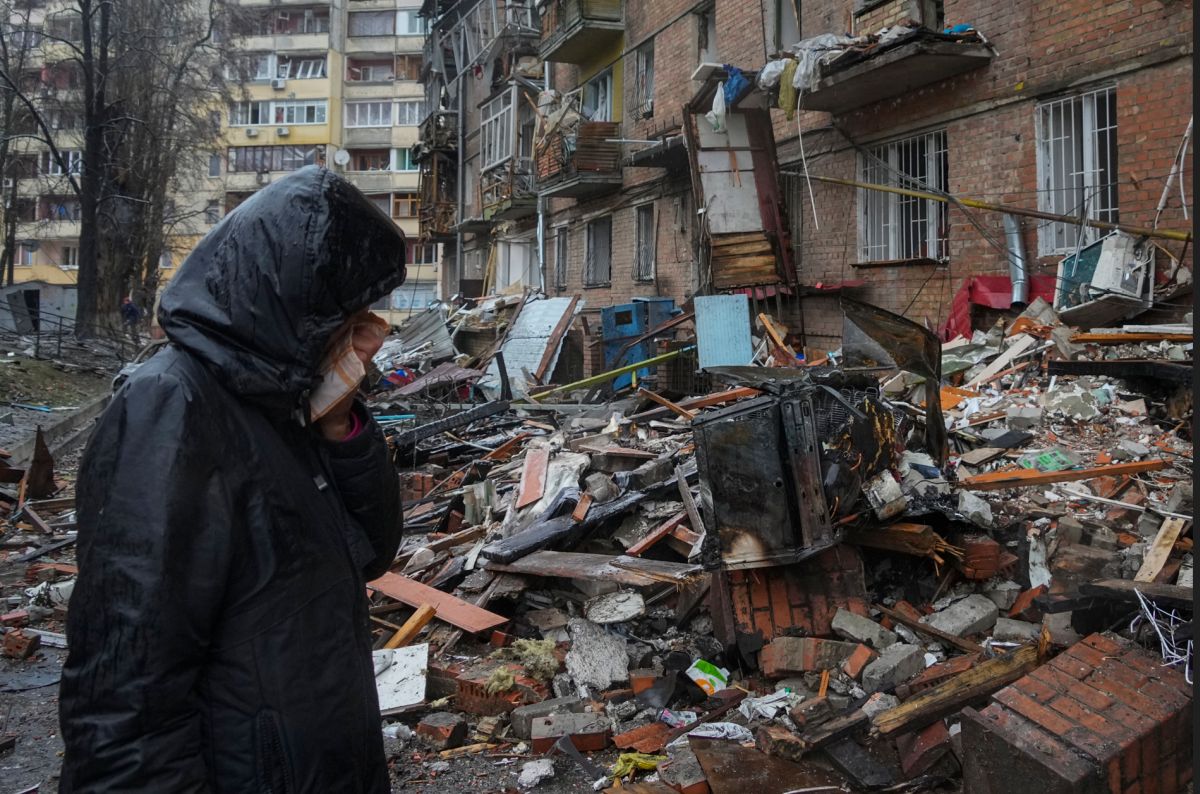
A woman cries in front of a house damaged during Russian shelling in the town of Vyshgorod near Kyiv, Ukraine, on Nov. 24, 2022. (AP)
The U.S. digital intelligence firm Nisos in Alexandria, Virginia, found in October that four platforms — Gab, Gettr, Truth Social and roughly 275 accounts on Twitter — were methodically sharing video content that tracked to one source: a Telegram account tied to the state-run media organization RT, formerly known as Russia Today.
Subtitled into 18 languages, the posts showed first-person videos in which people who were described as Ukrainian civilians testified about how their lives were aided by the Russian military and harmed by Ukrainian forces.
"The overall goal, consistent with Russian propaganda objectives, is to reframe the narrative on the war in Ukraine," Nisos wrote in its report. "The channel’s videos all tell the same story from different angles, claiming that the Russian military is generously saving a Ukrainian population besieged by a corrupt, genocidal government and by Nazi militants."
‘Ukraine is not a country’: Putin’s foundational lie
In 1990, Ukraine's parliament declared its independence from the Soviet Union, a call it repeated in August 1991. Ukraine finally gained its independence four months later. In December 1991, Ukrainians voted overwhelmingly for independence, and within days, the USSR dissolved. In 1994, Ukraine agreed with the U.S., the United Kingdom and Russia to exchange its nuclear arsenal, the world's third-largest, for security guarantees.
But the rush of post-Soviet history grated on Putin.
A veteran of the KGB, the Soviet Union’s internal security services, Putin has served as Russia’s top leader since 1999, with a four-year period in which he was nominally No. 2 but was widely considered the country’s ultimate center of power.
He has long sought to establish the theoretical foundations for escalating the war in Ukraine, a country with about one-third the population of Russia and about one-ninth the gross domestic product.
As early as 2008, he told then-President George W. Bush that "Ukraine is not a country."
Since then, Putin has asserted that there is no such thing as a Ukrainian people separate from Russia.
"These claims were designed to deny the existence and agency of the Ukrainian nation," said Erik Herron, a West Virginia University political scientist and author of the book "Elections and Democracy after Communism."
Yet, the history of Ukraine has involved several empires or states, some of which were entirely separate from Russia, Eugene Finkel, an associate professor with Johns Hopkins University’s School of Advanced International Studies, told PolitiFact on the eve of the war.
Putin set the table for the 2022 invasion with a 5,000-word essay in July 2021. In it, he argued that much of modern-day Ukraine occupies historically Russian lands and that "Russia was robbed" of them.
In remarks to the Russian security council Feb. 25, Putin addressed the Ukrainian army with a warning: "Do not let these neo-Nazis (and ultra-nationalists) use your women, your children, your elderly as human shields."
First, Ukraine’s President Volodymyr Zelenskyy is Jewish; he lost family in the Holocaust. And although neo-Nazi groups exist in Ukraine, Putin has repeatedly exaggerated the power they hold. In 2014, the white-supremicist-led Azov battalion played a key role in winning Mariupol back from Russian separatists. The group received appreciation from some within the Ukrainian government for its fight against Russia, but experts say it represents a small portion of Ukraine’s military. There’s no evidence Ukraine is a Nazi state.
The U.S. State Department said Putin exploits this grain of truth to "manipulate international public opinion by drawing false parallels between Moscow’s aggression against Ukraine and the Soviet fight against Nazi Germany."
Scholars widely agree: Soon after the war started in February, more than 140 signed a letter denouncing Putin’s narrative as "factually wrong, morally repugnant and deeply offensive to the memory of millions of victims of Nazism and those who courageously fought against it, including Russian and Ukrainian soldiers of the Red Army."
‘A war fought on disinformation’: Tracing the lies
At NewsGuard, a journalistic website that rates the credibility of news sources, journalists rolled out the Russia-Ukraine Disinformation Tracking Center. The project has identified more than 300 websites that regularly share false claims about the war. The sites were in many languages, but more than half were in English.
>Matt Skibinski, NewsGuard’s general manager, said that when news of the invasion broke, the organization’s response "was clear as day: If there’s a war being fought over disinformation, we need to be tracking it as closely as we possibly can."
Pro-Russia accounts have used Telegram and other platforms to spread fake posts that pretend to be reports by BBC News or CNN. Adding to the confusion, some supposed "wartime" videos that have spread across platforms like TikTok and Facebook don’t show the Ukraine conflict at all; their sources have ranged from video games to past conflicts to unrelated training exercises.
The European Union banned state-run media RT from sharing its content in Europe, but researchers at the U.K.-based Institute for Strategic Dialogue identified numerous duplicate websites created to evade the restrictions. The same outlet funneled misleading content to TikTok; NewsGuard found TikTok was offering Russian disinformation within minutes of new users logging in.
Madeline Roache, NewsGuard’s managing editor in the United Kingdom, said Russia’s disinformation apparatus is expert at confusing the public.
"Because Russia is so good at being persistent at putting out disinformation, I really worry that the constant drumbeat, even with all the fact-checks that we put out, will still affect people’s perceptions of Ukraine, perceptions of Russia," Roache said.
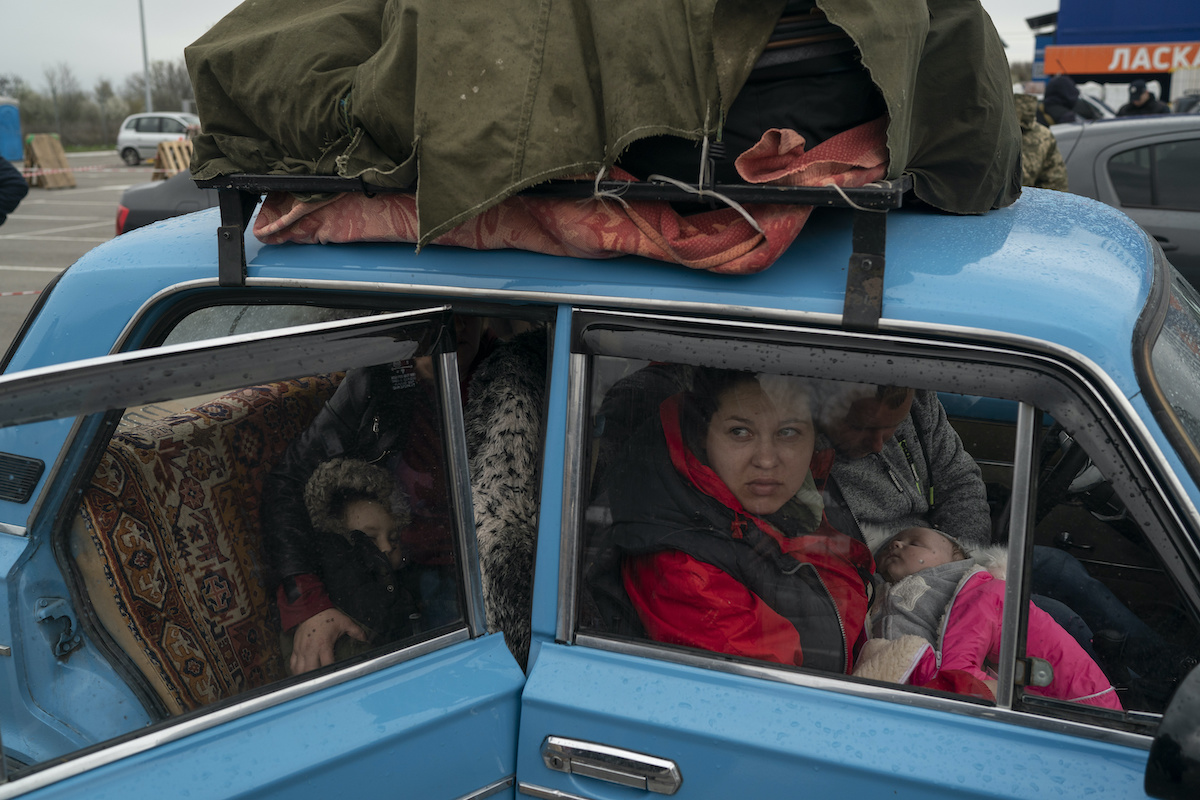
Internally displaced people from Mariupol and nearby towns arrive at a refugee center fleeing from the Russian attacks, in Zaporizhzhia, Ukraine, Thursday, April 21, 2022. (AP)
If disinformation campaigns are part of Putin’s arsenal, they are even more powerful in combination with the nation’s censorship efforts.
Moscow bans Western websites and social media platforms, with tough penalties for social media users. People sharing content about Russian troops that the government deems to be "fake" face imprisonment. Although Russian residents can use virtual private networks, or VPNs, to circumvent bans, propaganda holds a powerful grip.
Figures from Russia’s only independent polling research firm, Levada, suggest Russia’s control of information has been effective inside its borders: Putin’s approval ratings have improved since the war began — from 69% in January to 79% in November — while negative attitudes toward the U.S. and EU have risen.
It’s not unusual for authoritarian leaders to lie in an attempt to strengthen their hold on power. What sets Putin apart "is the length to which he is willing to go — destroying his own country and a neighbor — for fanciful, unrealistic, imperial motives," said Yoshiko Herrera, a University of Wisconsin-Madison political scientist and author of "Imagined Economies: The Sources of Russian Regionalism."
‘Biolabs’: When lies find co-conspirators
If Putin was looking for U.S. allies in the disinformation space, he found a winner Feb. 25, the day after the invasion.
That was the day a QAnon-tied Twitter user with the now-suspended handle @WarClandestine posted a false conspiracy theory that Russia was invading Ukraine to target dangerous U.S.-run bioweapons labs.
Numerous fact-checks debunked this claim. There are no U.S.-run bioweapons facilities in Ukraine, which joined the U.S. in signing the 1972 convention that prohibited the development, production and possession of biological weapons. The U.S. has instead helped support and secure Ukrainian biological research labs as they study pathogens and strive to prevent infectious disease outbreaks.
But the false narrative gave people who dislike the current U.S. leadership an easy-to-understand story that made Russia seem heroic in the face of a scheming U.S.-Ukraine partnership.
The lie fit with previous Russian disinformation efforts that sought to convince the world that the U.S. was cooking up bioweapons in labs in Ukraine. This time, it was amplified by China’s Foreign Ministry, Fox News host Tucker Carlson and conservative commentator Candace Owens. Far-right media outlet The Gateway Pundit went further, falsely claiming that the Pentagon "admitted" there were 46 such labs.
By March, the subject became a line of questioning in a U.S. Senate Foreign Relations Committee hearing. At the White House, then-Press Secretary Jen Psaki warned Russia could be using the narrative as cover.
By April, the narrative included a new, misleading claim that Biden’s son Hunter was funding the supposed bioweapons labs.
NewsGuard’s Roache said the claim spread partly because Hunter Biden was affiliated with an investment company that raised money for a startup that does work related to global health. His involvement with the investment decision is frequently cited by his father’s political enemies, but remains unproven.
"The claims that I have seen spread to be more widespread are the ones that have a grain of truth," Roache said.
Profound pain, far and wide
The global consequences of a war premised on lies have been severe.
Our Sources
Vladimir Putin "On the Historical Unity of Russians and Ukrainians," July 12, 2021
Vladimir Putin, "Address by the President of the Russian Federation," Feb. 21, 2022
Vladimir Putin, "Address by the President of the Russian Federation," Feb. 24, 2022
The Washington Post, "Read Putin’s national address on a partial military mobilization," Sept. 21, 2022
PolitiFact, "Russian spokesman’s statement ignores centuries of Russian attacks," Feb. 21, 2022
PolitiFact, "Putin’s one-sided history of Ukraine’s relationship with Russia," Feb. 23, 2022
PolitiFact, "Russia’s economy and Western sanctions: What you need to know," Feb. 25, 2022
PolitiFact, "Russia’s Pants on Fire claim that it is not occupying Ukrainian territory," March 3, 2022
PolitiFact, "Could a strike by Russia on Poland trigger Article 5 and bring NATO into war?" March 14, 2022
PolitiFact, "Russia, Ukraine, and the contested language of genocide," April 11, 2022
PolitiFact, "What are 'tactical' nuclear weapons? And what do they mean for Russia, Ukraine and the world?" April 19, 2022
PolitiFact, "War crime prosecutions in the Russia-Ukraine war: What to expect," April 26, 2022
PolitiFact, "Are we closer to nuclear Armageddon than any time since 1962, as Biden suggested?" Oct. 10, 2022
PolitiFact, "Russia’s Pants on Fire claim that it is not occupying Ukrainian territory," March 3, 2022
PolitiFact, "One America News runs conspiratorial segment claiming strike on Mariupol hospital was US false flag," March 22, 2022
PolitiFact, "Russia pushes false crisis actor claims about video from Bucha, Ukraine," April 4, 2022
PolitiFact, "How ‘War on Fakes’ uses fact-checking to spread pro-Russia propaganda," Aug. 8, 2022
PolitiFact, "False flags: They’re real, but far less widespread than social media suggest," Feb. 8, 2022
United Nations, "UN report details summary executions of civilians by Russian troops in northern Ukraine," Dec. 7, 2022
World Bank, "Russian Invasion of Ukraine Impedes Post-Pandemic Economic Recovery in Emerging Europe and Central Asia," Oct. 4, 2022
Organization for Economic Cooperation and Development, "Paying the Price of War: OECD Economic Outlook, Interim Report," September 2022
Brookings Institution, "Crimea: Six years after illegal annexation," March 17, 2020
Bruegel, "European natural gas imports," Nov. 22, 2022
BBC, "Ukraine war: US estimates 200,000 military casualties on all sides," Nov. 10, 2022
Insider, "Russian troops in Ukraine have suffered as many deaths as the entire 9-year Afghan war that contributed to the USSR's collapse," April 25, 2022
CBS News, "New report details Russian torture of Ukrainian civilians," July 15, 2022
The New York Times, "Russian invasion forces penetrate Ukraine on multiple fronts and close in on Kyiv," Feb. 24, 2022
Forbes, "War Has Caused $108 Billion In Damage To Ukraine’s Infrastructure, Study Finds," Aug 2, 2022
New York Review of Books, "The Victory of Ukraine," April 7, 2016
The New York Times, "How Russian Media Uses Fox News to Make its Case," April 15, 2022
National Public Radio, "Kyiv or Kiev? Why people disagree about how to pronounce the Ukrainian capital's name," Jan. 25, 2022
FactCheck.org, "The Facts on ‘De-Nazifying’ Ukraine," March 31, 2022
Jewish Journal, "Statement on Statement on the War in Ukraine by Scholars of Genocide, Nazism and World War II," Feb. 27, 2022
CBS News’ 60 Minutes, "The stories of the victims found in a mass grave in Bucha, Ukraine," Oct. 16, 2022
Twitter post, April 3, 2022
Russian Ministry of Defense on Telegram (archived), April 3, 2022
Russian Ministry of Defense on Telegram (archived), Oct. 24, 2022
Russian Foreign Ministry on Telegram (archived), April 3, 2022
Twitter post (archived), April 1, 2022
Russian Embassy in Canada on Twitter (archived), March 1, 2022
Ministry of Foreign Affairs for Ukraine, 10 facts you should know about Russian military aggression against Ukraine, Dec. 19, 2019
Protect Democracy, "The Authoritarian Playbook," June 15, 2022
Nisos, "Russian’s RT Leads a Global "Information Militia" on Social Media to Bypass Censorship on Ukraine-Related Disinformation," Oct. 5, 2022
Yuri-Levada Analytical Center, "Putin’s approval ratings," accessed November 2022
Sky News, "Ukraine war: 'Russia did not attack Ukraine', says Russian foreign minister Sergei Lavrov," March 10, 2022
Gizmodo, "Russian Embassy Accounts Are Skirting Twitter's Disinformation Policies," April 21 2022
Bloomberg News, "Russian Propaganda Is on Social Media, But Not Where You'd Think," April 21, 2022
The Washington Post, "Big Tech tried to quash Russian propaganda. Russia found loopholes," Aug. 10, 2022
Voice of America, "In Photos: Russia's Invasion of Ukraine, March 1, 2022," March 1, 2022
The BBC, "Bucha killings: Satellite image of bodies site contradicts Russian claims," April 11, 2022
New York Times, "Satellite images show bodies lay in Bucha for weeks, despite Russian claims," April 4, 2022
The New York Times, "How the Russian Media Spread False Claims About Ukrainian Nazis," July 2, 2022
Anti-Defamation League, "ADL Statement on Russian Invasion of Ukraine," Feb. 24, 2022
U.S. Holocaust Memorial Museum, "Museum Condemns Russia’s Invasion of Ukraine," Feb. 24, 2022
The Wrap, "Russian Officials Endorse Lara Logan’s Comments Linking Ukrainian Soldiers to Nazis and Occultism" March 21, 2022
The Associated Press, "Pregnant woman, baby die after Russian bombing in Mariupol," March 14, 2022
Atlantic Council’s Digital Forensic Research Lab, "Russian War Report: Russia promotes misleading video accusing Ukraine of using mannequins as casualties," April 3, 2022
Atlantic Council’s Digital Forensic Research Lab, "What Russia reads on Telegram: Nine out of the top ten political Telegram channels in Russia spread Kremlin pro-war propaganda," Oct. 21, 2022
Verify This, "Russian TV claimed Ukraine used mannequins to fake war casualties. That video is actually from a TV show set," April 11, 2022
Newsweek, "Fact Check: Did Putin Suggest Russia Would Use Ukrainians as Human Shields?" Oct. 21, 2022
Aljazeera, "Opinion: Why we need to challenge Russia’s human shields narrative," April 3, 2022
NPR, "Russia's at war with Ukraine. Here's how we got here," Feb. 24, 2022
BBC News, "Soviet Union timeline," Oct. 31, 2013
CNBC, "‘There may be no light for a very long time’: Ukrainians face a massive test of survival this winter," Nov. 22, 2022
The New York Times, "A Chatty Putin’s Underlying Message: I’m Still in Charge," Dec. 10, 2022
Twitter post by Anton Gerashchenko, Dec. 6, 2022
Vladimir Putin, Press conference following the visit to Kyrgyzstan, Dec. 9, 2022
Email interview with Eugene Finkel, associate professor with Johns Hopkins University’s School of Advanced International Studies, Feb. 23, 2022
Email interview with Courtney Hillebrecht, director of the Forsythe Family Program on Human Rights and Humanitarian Affairs at the University of Nebraska-Lincoln, Nov. 23, 2022
Email interview with Anthony Clark Arend, professor of government and foreign service at Georgetown University, Nov. 18, 2022
Email interview with Stuart Ford, law professor at the University of Illinois-Chicago, Nov. 22, 2022
Email interview with Nina Eichacker, economist at the University of Rhode Island, Nov. 21, 2022
Email interview with Clark Williams-Derry, energy finance analyst at the Institute for Energy Economics & Financial Analysis, Nov. 21, 2022
Email interview with Hugh Daigle, associate professor of petroleum and geosystems engineering at the University of Texas-Austin, Nov. 18, 2022
Email interview with Gary Burtless, senior fellow at the Brookings Institution, Nov. 18, 2022
Email interview with Michael O’Hanlon, foreign policy specialist at the Brookings Institution, Nov. 18, 2022
Email interview with Lance Janda, military historian at Cameron University, Nov. 18, 2022 and Dec. 8, 2022
Email interview with Mark Finley, fellow in energy and global oil at Rice University, Nov. 21, 2022
Email interview with Brendan Green, professor at the University of Cincinnati, Nov. 18, 2022
Email interview with Hannibal Travis, law professor at Florida International University, Nov. 18, 2022
Email interview with Mai’a K. Davis Cross, director of the Center for International Affairs and World Cultures at Northeastern University, Nov. 18, 2022
Email interview with Alexander K. A. Greenawalt, law professor at Pace University, Nov. 18, 2022
Email interview with Kyle Rapp, postdoctoral student in political science and international relations at the University of Southern California, Nov. 18, 2022
Email interview with Paul Robinson, professor of public and international affairs at the University of Ottawa, Nov. 18, 2022
Email interview with Milena Sterio, Cleveland State University law professor, Nov. 18, 2022
Email interview with Alexander Motyl, political scientist at Rutgers University-Newark, Nov. 18, 2022
Email interview with Steven Pifer, scholar at the Brookings Institution, Nov. 18, 2022
Email interview with Erik Herron, West Virginia University political scientist, Nov. 22, 2022
Email interview with Richard Arnold, political scientist at Muskingum University, Nov. 18, 2022
Email interview with Yoshiko Herrera, University of Wisconsin-Madison political scientist, Nov. 18, 2022
Email interview with David Silbey, historian at Cornell University, Dec. 8, 2022
Interview with Frank Sysyn, professor at the Canadian Institute of Ukrainian Studies at the University of Alberta, Nov. 18, 2022
Interview with Matt Skibinski, general manager NewsGuard, Nov. 23, 2022
Interview with Madeline Roache, managing editor, UK, at NewsGuard, Nov. 23, 2022
Email interview with Eto Buziashvili, research associate, Caucasus, at the Atlantic Council’s Digital Forensic Research Lab, Nov. 30, 2022
Telegram interview with Nadezhda Kolobaeva, Nov. 22-23, 2022


